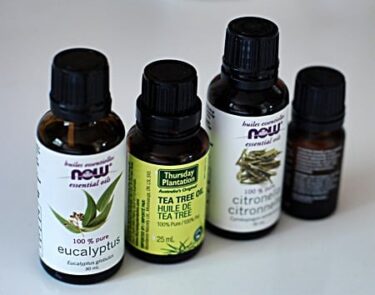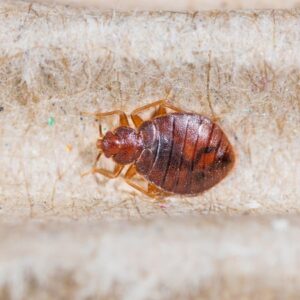Everyone ‘prefers’ natural remedies for getting rid of bed bugs, not least because they tend to be less toxic. The issue is that natural pesticides aren’t as good at killing bed bugs as synthetic pesticides or heat treatment.
Some natural remedies can kill bed bugs, but not get rid of whole infestations. Bleach, tea tree oil, and diatomaceous earth kill bed bugs on contact but are ineffective at killing ‘hidden’ bed bugs and their eggs. No natural remedy is as good as pesticide or heat treatment.
Natural remedies are better for killing small infestations than big ones. But even then, pesticides and exterminators are more effective.
Best Natural Treatments for Getting Rid of Bed Bugs
The main way that people kill bed bugs is with pesticides, but they can be dangerous in the wrong hands. Now surprisingly, various natural methods for killing bed bugs started to grow in popularity.
| Pesticides | Pyrethrin and pyrethroids kill on contact, and for weeks indirectly. |
| Tea Tree Oil | Tea tree oil has a pesticidal action. Kills on contact but doesn’t kill eggs or hidden bed bugs. |
| Bleach | Bleach kills on contact, but doesn’t kill bed bugs or eggs that you miss. |
| Diatomaceous Earth | A powder made from pulverized rocks. Diatomaceous earth strips away the outer layer of a bed bug’s exoskeleton, which makes it dehydrate and die. |
| Rubbing Alcohol | Rubbing alcohol is a solvent, so it destroys the outer layer of a bed bug’s exoskeleton. |
| Vinegar | Vinegar is acidic, but it doesn’t kill or repel bed bugs. |
Tea Tree Oil
One of the most popular natural ways to kill bed bugs is with tea tree oil. Tea tree is a kind of essential oil. It’s one of the strongest available, and has a scientifically demonstrated pesticidal effect.
There are commercial bed bug sprays that contain tea tree oil as one of the active ingredients. Alternatively, you can use a tea tree spray you’ve made by yourself.
Tea tree oil kills bed bugs by suffocating them as bed bugs don’t have lungs. Instead, they have tubes in their outer shell which are like pores, but allow air to flow in and out. Tea tree oil clogs up these holes so that the bed bug can’t breathe.
However, like other essential oils, it only works on direct contact. Otherwise, all the spray does is repel the bed bugs. This may sound good, but it’s not, because it encourages the bugs to spread around your home.
This means that the tea tree oil will only kill some of the bed bugs when you spray it. That’s because bed bugs are good at hiding.
So, even if you spray your mattress, there will be some that you don’t hit directly. Also, tea tree oil won’t kill eggs that haven’t hatched yet.

Bleach
Bleach is an effective home remedy for killing pests. It’s thought that it works in much the same way as other natural pesticides, by blocking the bed bug’s respiratory system. This leads to the bed bug suffocating.
Cleaning with bleach can be an instinctual reaction to pests. According to a letter in the BJGP, even doctors reach for bleach when they discover bed bug infestations.
It serves the dual purpose of cleaning away bed bugs feces and bloodstains, and perhaps also killing or repelling the bugs.
Bleach is toxic to life. Any animal would die if it ingested or inhaled bleach in significant enough quantities. That applies to bed bugs and any other pest that may be in your house.
Like other home remedies for bed bugs, though, the issue isn’t whether the substance can kill a bed bug. It’s getting the substance to make contact with the bed bug, e.g. through spraying bleach directly on the pest.
Another way that people use bleach to kill bed bugs is through picking up and putting loose bed bugs into a cup or jar of bleach.
This ensures direct contact, so the bed bug dies. However, bed bugs drown in water, so this doesn’t mean that bleach is good for killing bed bugs.
Diatomaceous Earth and Bed Bugs
Diatomaceous earth is a kind of soft powder which serves several household uses. It’s made from powdered sedimentary rock and looks like talc. One of the things it’s used for is as a natural bed bug killer.
To use diatomaceous earth, you sprinkle it in the places you see bed bugs. When the bed bugs walk through the D.E., it sticks their exoskeletons and kills them. D.E. kills pests in two ways.
- It can clog up the respiratory system
- It dries out the bed bug
All bed bugs have a thin, waxy layer on the surfaces of their shells. This layer stops water from getting in or out, like a coating of sealant.
When it’s stripped away, the water in a bed bug’s body will evaporate, leaving it dehydrated. This can kill it quickly because bed bugs don’t drink water and only feed infrequently.
However, the issue with diatomaceous earth is that it doesn’t kill all bed bugs. It can only kill on direct contact.
According to the journal Insects, bed bugs will avoid walking through diatomaceous earth unless you sprinkle it on every surface.
Even then, it rubs or blows away over time. You have to constantly replace it. Because it isn’t perfectly effective, D.E. allows bed bugs to continue breeding and spreading while in use.
Rubbing Alcohol
Rubbing alcohol is pure or almost pure alcohol, the same kind as is found in drinks. However, it’s not designed for drinking, and has bitterants added to make it unpalatable. It’s used for things, such as disinfecting wounds.
It can kill bed bugs because it’s toxic to life. Alcohol is a poison, and will kill if ingested in large enough amounts. While a bed bug won’t ingest alcohol, it’s still poisonous in other ways (e.g. absorption).
Like essential oils, rubbing alcohol can be used as a spray. You can kill bed bugs by spraying them directly with rubbing alcohol.
Like diatomaceous earth, rubbing alcohol works in two ways. Because it’s a solvent, it dissolves the outer layer of the bed bug’s exoskeleton. This makes the bug dehydrate quickly upon contact. But it’s also poisonous.
The issue with rubbing alcohol is that it’s flammable. This means that it isn’t safe to be used in this manner. When you spray it onto your furniture and bedding, it is absorbed. The more rubbing alcohol is absorbed, the more flammable your furniture gets.
According to Clinical Microbiology Reviews, this has led to reported cases of burns. Because rubbing alcohol is a fire hazard, you shouldn’t spray it to kill bed bugs. You can drop bed bugs into a jar of rubbing alcohol to kill them, but again, you can use water with the same effect.
Vinegar and Bed Bugs
Vinegar is a common cure-all. One of the things people use it for is as a pest control spray. Several kinds of vinegar are used, including white vinegar and apple cider vinegar. Which kind you use is up to you.
The idea behind using vinegar as a bed bug spray is that it’s acidic. That makes it a popular home remedy which also happens to be natural.
There’s nothing in vinegar that kills bed bugs, or any other kind of pest. While it ranges from highly acidic to reasonably acidic, this isn’t something that kills bed bugs.
Even highly acidic vinegar won’t burn your skin, for example. If they won’t burn your skin, they won’t burn through a bed bug’s exoskeleton.
If you were to spray a bed bug with something exceptionally acidic, it would have the same effect as it would on your skin. It may burn through. It would at least be an irritant and leave a rash. But vinegar is nowhere near that acidic, so it won’t work.
Why Don’t Natural Remedies Kill Bed Bugs?
The problem is that natural remedies aren’t as effective as pesticides. Pesticides have been made by scientists to kill bed bugs in a highly efficient way. A tiny amount of a pesticide can kill a bed bug, and pesticides linger for weeks, constantly killing bed bugs.
Pesticides are only this good at killing bed bugs because chemists have researched how they work, and invented new and better ones over time.
Natural remedies, by contrast, are ineffective. Each listed above can kill a bed bug. But they have their limitations:
- Higher quantity. Only a few molecules of pesticide can kill a bed bug, but natural remedies require far more volume.
- Direct contact killer. You have to spray or put the natural remedy directly onto the bed bug. But a bed bug can walk over somewhere that pesticide was sprayed weeks ago and die.
- Don’t linger afterwards. Pesticides keep killing bed bugs for months. Because natural remedies work on direct contact, they don’t.
What this means is that natural remedies can kill individual bed bugs, but aren’t good at treating entire infestations.
This is crucial because it’s never enough to kill some bed bugs in an infestation. They breed so quickly that unless you attack the infestation continually, you won’t get rid of them all.


malathion works like magic but highly toxic to humans and pets.
I have been using scotch tap stickers to stick up all the bugs before it got away quickly and fold up the sticker to kill it but also not the best way it still able to reduce the bugs present and appear on the open space.